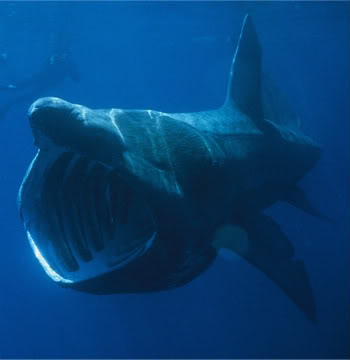|
|
Researchers with the Massachusetts Mariner Fisheries have uncovered the secret life of the world’s second largest fish, known for its cavernous mouth. The basking shark, which measures over 10 meters and weighs as much as seven tons, has long baffled scientists by disappearing from view half of every year. A new study from Current Biology found that the basking shark spends this time deep in the Atlantic’s tropical waters.
“While commonly sighted in surface waters during summer and autumn months, the disappearance of basking sharks during winter has been a great source of debate ever since an article in 1954 suggested that they hibernate on the ocean floor during this time,” says Gregory Skomal of Massachusetts Marine Fisheries. “Some 50 years later, we have helped to solve the mystery while completely re-defining the known distribution of this species.”
 The basking shark is the world’s largest fish after the whale shark. Photo by: Chris Gotschalk. |
Swimming at depths of 200 to 1,000 meters for weeks to months at a time the basking sharks migrate through the Atlantic Ocean’s tropical waters in the Caribbean. Despite their incredible size, “[basking sharks] have completely avoided detection by humans for millennia,” Skomal says. He describes the researchers as “absolutely surprised” by the discovery, since scientists have always assumed basking sharks never leave temperate regions where they feed on plankton. A filter feeder, basking sharks are harmless to humans. They use massive circular mouths to round-up plankton in great gulps.
The discovery of basking sharks migrating through the Caribbean has profound conservation impacts, expanding the species’ range and need for conservation protections.
“Coupled with recent genetic data, our finding indicates that the Atlantic population – and perhaps the world population – are connected and may constitute a single population,” Skomal said. “Hence, the global population of basking sharks may be even smaller than previously thought.”
Basking sharks are currently listed as Vulnerable by the IUCN Red List due to overfishing for its fins used in shark fin soup. However, if it turns out that the global population has been overestimated, the listing may need to be updated.
Related articles
Whale sharks threatened by interbreeding
(04/08/2009) The world’s largest living fish, the whale shark, is threatened by interbreeding, according to a new study in PLoS ONE. Comparing the DNA of 68 individual whale sharks from eleven locations across the globe, geneticists found that the whale sharks had little genetic variation between the populations.
Mysteries of the Great White Shark unveiled
(02/17/2008) The Great White Shark has always been a creature of mystery. The world’s largest shark has long fascinated humanity from the novel and film Jaws to recent sumptuous footage of the sharks catching sea lions in Planet Earth. The behemoth, who at times can reach seven meters in length, has also become famous for occasionally attacking swimmers and surfers, though scientists believe the sharks do not intentionally hunt humans. However, the great predator’s behvaior and lifecycle remains mostly mysterious to science. Some of these mysteries are just now being unraveled thanks to the Tagging of Pacific Predators (TOPP) program.
Shark fin does not cure cancer
(06/03/2007) Shark cartilage, long believed in traditional medicine to be an anti-cancer agent, confers no health benefits in lung cancer survival reports an extensive study presented at the 43rd annual meeting of the American Society of Clinical Oncology. The lead author said the findings cast major skepticism on shark cartilage products that are being sold for profit and have no data to support their efficacy as cancer-fighting agent.